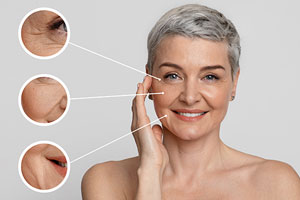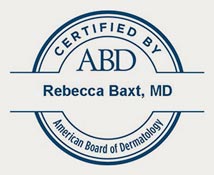
While sun safety is always in season, the summer months are especially important to know how you can protect your skin from sun damage. No matter the season or the weather, your skin is exposed year-round to ultraviolet (UV) rays. At BAXT CosMedical®, Dr. Rebecca Baxt, board-certified dermatologist, stresses to her patients the importance of preventing the damage that can be done to your skin.
Most of us know that if you spend time in the sun and your skin is unprotected, your risk of skin cancer significantly increases. In fact, skin cancer is the most common form of cancer in the U.S. Unfortunately, “skin cancer is on the rise in the U.S. with estimates there were 100,640 new cases of skin melanomas and 8,290 related deaths in 2024.” 1
Listen to Dr. Baxt’s Podcast on Skin Cancers and Treatments Basics | Basal Cell Carcinoma, Squamous Cell Carcinoma, Melanoma, Merckel Cell Carcinoma

The sun also contributes to premature skin aging, including:
- Wrinkles and lines
- Dry, dull, and leathery skin
- Hyperpigmentation
- Age spots, aka “sunspots”
- Loss of skin elasticity
While a number of factors causes skin damage, sun exposure is top on the list.
Learn how you can protect your skin while in the sun and lower your risk of skin cancer.
Five Effective Skin Protection Tips
1. Dr. Baxt advises that you should ALWAYS apply sunscreen protection of 30 SPF or above, a higher number is better, but not the most important thing. The most important rule is to apply sunblock daily and reapply it every 1-2 hours. Even if it is cloudy, please apply sunblock. The ultraviolet rays can get through the clouds and people get bad burns on cloudy days.
2. Remember, more is better, apply your sunscreen in a thick coat. Creams are generally better than sprays. Don’t forget to apply sunscreen around the ears, on the back of the neck, and on the tops of the feet as these are common areas for burns.
3. If you are sweating, very fair skinned, or in the water, apply sunscreen every 1 hour. Otherwise, every 2 hours is fine.
4. Make sure your sunscreen product has not expired. Zinc oxide or titanium oxide sunscreens tend to last longer than chemical sunscreens, so they tend to be a bit more expensive. My recommended favorite ingredient is zinc oxide, but whatever sunscreen you like is the best one to use.
5. No sunscreen completely blocks UV radiation. Therefore, other protections are needed such as protective clothing, a hat, and sunglasses, and staying in the shade. Wearing a hat is really helpful to prevent UV exposure. Preferably, a hat with a brim, but even a baseball cap helps. This is especially important if you don’t have much hair; in that case, be sure to apply sunscreen to the top of your head. Additionally, wearing SPF shirts like swim shirts or sun shirts give you added protection both in and out of the water.
While everyone ages and the aging process is primarily visible on people’s faces, there are ways to prevent premature skin aging and to help renew and revitalize the skin to a more youthful appearance. Dr. Rebecca Baxt advises her patients that skin aging is a complex process influenced by both genetic factors, hormone and metabolic conditions, and environmental factors, including sun exposure, smoking, pollution, chemicals, and toxins. Another significant factor is how well you take care of your skin.
At BAXT CosMedical®, Dr. Rebecca Baxt and her skin care professionals offer a full complement of non-surgical anti-aging procedures, treatments, and products. These advanced services can help you turn back the clock and maintain a more youthful and radiant appearance. Learn more anti-aging treatments. Learn more anti-aging treatments
 Dr. Rebecca Baxt is a board-certified dermatologist who has completed extensive education and clinical training. Dr. Rebecca Baxt holds memberships and fellowships in many professional organizations. Schedule a consultation with Dr. Baxt for your dermatological medical or cosmetic concerns. Her cosmetic and medical dermatology office is located in Paramus, NJ (serving Bergen County, New Jersey communities, and surrounding states).
Dr. Rebecca Baxt is a board-certified dermatologist who has completed extensive education and clinical training. Dr. Rebecca Baxt holds memberships and fellowships in many professional organizations. Schedule a consultation with Dr. Baxt for your dermatological medical or cosmetic concerns. Her cosmetic and medical dermatology office is located in Paramus, NJ (serving Bergen County, New Jersey communities, and surrounding states).
Additional Skin Cancer Tips and Articles
Dr. Rebecca Baxt was selected and interviewed by Today on the topic of, “18 Dermatologist-Approved Anti-Aging Products To Add To Your Skin Care Routine.” The topics covered included the importance of sunscreen, use of retinoids, Vitamin C creams, acids, peptides, moisturizers, and other skin health and anti-aging ingredients.
“Moisturizers of any variety (e.g., lotions, creams, serums and ointments) generally” are often labelled as antiaging since moisturizing reduces the appearance of wrinkles, and the FDA allows that labeling,” says Dr. Baxt. READ FULL ARTICLE
- May is Skin Cancer Awareness Month: Prevention and Early Detection is Key
- Why You Need An Annual Skin Cancer Screening
- Skin Cancer Awareness: The Truth Behind This Disease
- Top 5 Sunscreen Rules to Avoid a Sunburn
1 Cancer Stat Facts: Melanoma of the Skin, National Cancer Institute

